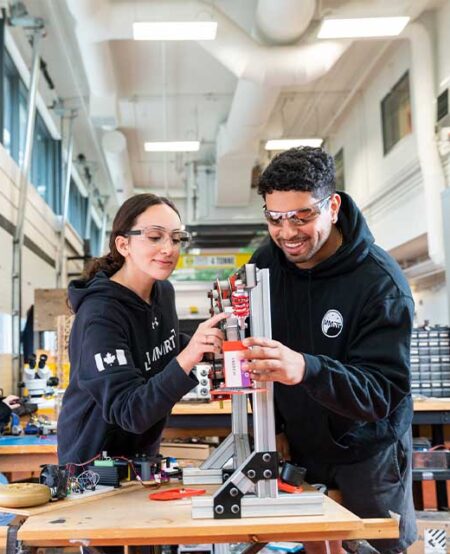- Length
- 5 years
- Degree
- Bachelor of Engineering & Society (Co-op Available)
- Program
- Engineering
- Options
Program highlights
Computer Engineering is the field that studies the science and technology of design, implementation and validation of both hardware and software components of computing systems. It encompasses computer hardware, programming, electronics, digital communications, multimedia, signal processing, robotics and other related technologies.
Computer Engineering combines the best of both worlds: design of hardware (Electronic Engineering) and software (Computer Science) components.
Engineering and Society advantage
Core courses include:
- The Culture of Technology
- Case Studies in the History of Technology
- Preventive Engineering: Environmental Perspectives
- Social Control of Technology
In addition, three courses called Inquiry in an Engineering Context, develop skill at formulating questions, carrying out research and communicating findings. These courses help to examine the complex nature of issues like sustainable development and systems failure.
Admission requirements


Careersand research
Since you specialized in two fields you will have tremendous freedom in choosing types of project you want to work on and/or your career. As an example you may choose to work on the development of the medical devices such as medical robots. Or you may choose to design and implement control algorithms that control water level in water dams. Another option is to work for a power utility company and design code that controls substations in a power utility grid. You may also work with automotive designers to design Microsystems that control fuel ignition in hybrid vehicles. The opportunities are unlimited!
Examples of Canadian companies:
- Texas Instruments
- Advanced Micro Devices (AMD)
- Ericsson
- Evertz
- GE Canada
- IBM Canada
Research areas
- Internet of Things
- Image processing and multimedia
- Computer networks and signal processing
- Microelectronics and embedded systems
- CAD/optimization/simulation
- Parallel processing
- Neural computing
- Computer security
- Biological computing
Need moreinformation?
How to apply
Understand every step, from applying, to accepting your offer and joining us on campus!
Department of Electrical and Computer Engineering
We’re electrifying the world of engineering.




